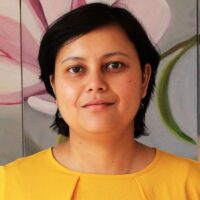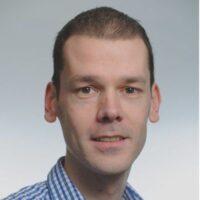Meet the Researcher
5 minutes with... Manisha Nair

Could you describe your current role in one sentence?
I’m an Associate Professor, Senior Epidemiologist, Medical Research Council (MRC) Career Development Fellow, and Chief Investigator for the Maternal and perinatal Health Research collaboration, India (MaatHRI).
What is your favourite thing about it?
I love being able to design research studies to improve maternal and child health, globally. I enjoy working with people from different disciplines and different countries that allows me to think out of the box. Another thing that makes me happy is analysing data using Stata software.
… And what is your least favourite thing about it?
While I love meeting people and visiting countries in Asia and Africa as part of my research work, I don’t like flights. I love airports, but not flights.
Moving on to the science, could you tell us about what you’re most excited about or interested in in your own work?
I am most excited about a project that is investigating heart failure in pregnant women with anaemia. Heart failure is a significant cause of maternal death in India, but echocardiography is rarely used because the machines and cardiologists are not available in many hospitals, or in high demand.
We trained obstetricians to use hand-held echocardiography machines at the bedside and experts interpret the images remotely and this has paved the way for testing the application of this simple intervention more widely across India.
Could you outline your route to where you are today?
I am from a small town in the state of Assam in India, and I never imagined that I would one day be an Associate Professor at Oxford! I qualified and worked as a doctor in India before working for the World Health Organisation in India for several years. I then moved to the UK and studied for an MSc in Global Health Science, and then a D.Phil in Public Health. I was then employed by NDPH as an epidemiologist.
If you could give one piece of advice to your 18 year old self what would that be?
Don’t look back, keep going. The challenges, discrimination, abuse, bullying and harassment that you face as a woman will only make you stronger as you grow.
5 minutes with... Jonathan Emberson

What is your job?
I’m a medical statistician and epidemiologist. What that means is that I look at data collected on as many people as possible and use it to try to understand something new about the pattern or causes of disease, or about the effects of a new drug treatment. The diseases I normally study are cardiovascular diseases, such as heart attacks and strokes, but for the past 18 months I have also been studying COVID-19.
What attracted you to the job and what do you like most about it?
It seemed like a really interesting way to apply my mathematics and statistics skills to important health-related problems. And it still feels that way. I’m fortunate enough to work on a range of interesting and varied projects; from studying the effects of cholesterol-lowering drugs, to analysing COVID-19 drug treatments, to leading a team investigating the major causes of disease in Mexico.
What do you like least about it?
Honestly, nothing really springs to mind.
What’s the thing you are most proud of in your professional life?
In June 2020 I was part of the team that discovered that a cheap steroid called dexamethasone substantially reduced the risk of death in the sickest patients hospitalised with COVID-19. That discovery changed clinical practice worldwide overnight and has estimated to have saved about a million lives in the past year.
What has been your career path?
Without really knowing what I wanted to do for a job, I did a Maths degree at university and followed that with a master’s degree in statistics. Through one of my lecturers at university I was lucky enough to get the opportunity to work at a clinical trials centre in Sydney, where I worked for a year before returning to the UK. I worked in London for a few years at University College, obtained my PhD in Epidemiology, and then moved to Oxford. Oxford does some of the best medical research in the world and, as a result, I’ve not yet been tempted to leave.
Do you have any advice for someone wanting to pursue this type of career?
Perhaps start by visiting our website (www.ndph.ox.ac.uk), have a read and see if you find it interesting. The work I do doesn’t just involve statisticians of course; people from a range of scientific backgrounds are needed. Look at some of the news articles linked to our work and see what you think. Also, feel free to email any of the researchers you find on the website and ask them any questions you may have.
How much do you earn?
Definitely less than a footballer but definitely enough to live well!
What was your favourite subject at school and why?
PE, art and mathematics. The subject I was naturally best at was maths which explains why I chose to study it at university.
If you could give one piece of advice to your 18 year old self what would that be?
Enjoy what you’re doing, keep an open mind about where it might lead you in the future, and don’t worry too much if you’re not quite sure where that is just yet.
